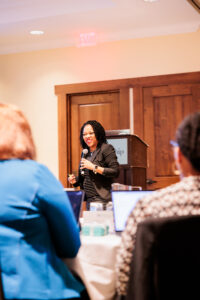“I think when people think of misogynistic behaviors, they automatically think that it’s men to women. But misogyny goes both ways. While there are more women who experience it, it happens across the board and we don’t talk about it enough.”

That was the sentiment behind Cincinnati Public Schools Superintendent Iranetta Rayborn Wright’s keynote speech for the District Administration Leadership Institute’s Leadhership event.
But how should leaders address this issue as it relates to the superintendency? District Administration sat down with Wright at the DALI Superintendents Summit this month in Lake Geneva, Wisconsin. Here’s her advice for district leaders:
Note: the following transcript has been edited for clarity and brevity.
On a personal note, where is this message coming from? Is it based on your lived experiences?
I think the answer is yes. One of the things that I share with people is that I’m not an expert, I just talk from my own experiences and the experiences of others I’m connected to. Because we want to make sure we are empowering others, especially women, to rise above. You’re going to have challenges, but they don’t have to be a death sentence. How do you lead through it? How do you not just survive, but how do you thrive?
Last year, I was helping facilitate an all-female superintendent panel at the National Alliance of Black School Educators. Most of the women in the room were female and in some form of educational leadership. Listening to the commentary that was given by the female superintendents, many of whom are very dear friends of mine, I watched and read the room and I recognized that there were so many women who were hurting. And from my own experiences, I know that there is a way to rise above. That’s kind of where the seed was planted.
How are you intentionally empowering female leaders in your own district?
I have a lot of women in leadership in my organization. I think it’s important to me that I hire for quality, ability, work ethic and all the things that make that person the perfect fit for the role. I’m not specifically looking for a female or male candidate, I’m looking for the best candidate. And when I find the best candidate, I then work with them and cultivate them to the next level.
When I think about my own leadership team, I have 10 direct reports split 50/50 male and female. The women that I work with—not just in my own organization but also women I’ve worked with over the years—would say that I’m openly honest and consistent while giving quality feedback and excellent support. It’s helped them to grow and branch out.
I look for intentional ways to push individuals out of their comfort zones. I have a wonderful leadership team, and we’ve been able to develop the team that way. They are willing to be stretched. They’re willing to challenge the status quo and address things they see that might be areas of deficit.
Most female superintendents I’ve spoken to have mentioned that they were mentored by men as they were preparing for the superintendency. What advice do you have for male leaders in this position to help them avoid any mistakes that might bar female leaders from being their true selves?
My primary sponsors have been men. I think one of the reasons is because many men have the ability to see talent. To see ability and look beyond all of the other stuff. Sometimes women get caught up on the wrong thing. “You’re too short. You’re too tall. You’re too fat. You’re too skinny,” whatever the case may be. Sometimes those things cloud the real work. It can derail where you’re looking to go.
What I would say to men who are working with women or looking to continue to elevate women is to sponsor them. Say great things about them in the room. Identify their talents and skills and put them in areas and spaces that allow them to truly show what those talents and skills are.
Don’t be afraid to push them. Strong women come with a lot of balance. Female leaders are also wives, they’re mothers, they’re sisters, they’re aunts, they’re caretakers. They’re all of those things and they’re leaders. They don’t really get an opportunity to set those things aside and focus on leadership as men do.
Is there a question I didn’t ask that you wanted to answer?
Women collectively as leaders have to be comfortable with themselves. They have to be confident. And, unfortunately, confident female leaders can often be misconstrued as other things. If you think about the differences in male and female behavior, a man doing the same things a woman does could be considered assertive. But depending on the woman who does it, it’s considered aggressive. How do you bridge that gap between your ability to lead as a woman and not be impacted by the constant voice of judgment? You must surround yourself with people who support you, believe in you and have the willingness to give you authentic feedback.
I believe that every person needs a coach. If Lebron James can still have a coach, if Kobe Bryant still had a coach, everybody can use one. And sometimes you need more than one. If I were leaving one piece of advice for women, it would be to find a coach. Identify a person that you connect with.
Also, know your circle; know your squad. Identify the people you can go to when there is something you need and they’re not going to go out and talk about it. They’re going to keep your jewels as theirs and support you in every area you need. This work is tough, but it’s doable. Once it’s been done, it’s been done.
“You survived it, tell your story,” is a quote that’s been resonating with me. And when you finally understand and believe in that, then tell your story, because somebody needs to hear it.







